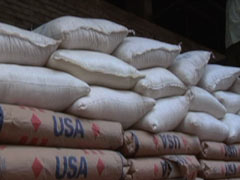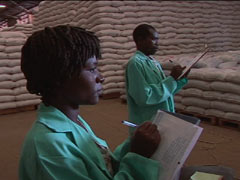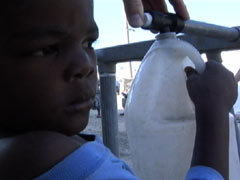In This Episode << SLIDE LEFT TO SEE ADDITIONAL SEGMENTS
William Easterly Extended Interview
Read more of the Religion & Ethics NewsWeekly interview on foreign aid with William Easterly, professor of economics at New York University:
Well, on balance the sad news is that [foreign aid] hasn’t worked. It hasn’t achieved the objectives that we had for the foreign aid program. The number one objective, of course, was to promote economic growth out of poverty for the aid receiving countries, and there we see a clear failure. The most aid-intensive countries have actually stagnated over the last fifty years. They’ve failed to see a rise in their living standards. That includes especially sub-Saharan Africa, some of the poorer Caribbean and Pacific Islands.
It’s been wasted both in actual corruption of aid money being stolen, because a lot of aid does go to very corrupt governments, and it’s also just been wasted bureaucratically by the ineffectual bureaucracies and the aid organizations themselves and in the ineffectual bureaucracies of the governments that receive the aid money.
Most of the success stories did not get a lot of aid, and most of the countries that did get a lot of aid are not success stories. We always have something in statistics we call confirmation bias, that if you strongly believe a given idea like aid works then you select a couple examples that fit the story. But when we look at the whole range of experience of success and failure, I’m afraid there is no reason to believe that aid has contributed to success.
 Hundreds of millions are escaping from abject poverty. In fact, we’ve seen the greatest reduction in poverty in our generation that has ever been seen in human history. Unfortunately, again, for aid, a lot of this has happened, just to give you two examples, in countries like China and India where a lot of the recent poverty reduction has been, and both of those countries received less than half a percent of their total income in aid, so it would be very hard to make the case that the great poverty successes in India and China have anything to do with aid.
Hundreds of millions are escaping from abject poverty. In fact, we’ve seen the greatest reduction in poverty in our generation that has ever been seen in human history. Unfortunately, again, for aid, a lot of this has happened, just to give you two examples, in countries like China and India where a lot of the recent poverty reduction has been, and both of those countries received less than half a percent of their total income in aid, so it would be very hard to make the case that the great poverty successes in India and China have anything to do with aid.
I do acknowledge that there are some successes in aid. It’s not that aid never works. I’m not claiming that. The successes are genuine. The Green Revolution was a definite success and the reduction in infant mortality. A lot of that is not due to aid, but there are some big successes in health that foreign aid has been very involved in, a provision of oral rehydration therapy for babies suffering from diarrhea and dehydration that often kills them, the widespread vaccination of children from common childhood killers like measles, but these are successes. So there are some successes. I agree with that.
Corruption is a really disappointing story in aid because, first of all, aid just ignored the whole issue of corruption for most of the last 50 years that aid has been given, and a lot of aid did go to very corrupt governors and it was, frankly just stolen, so it did not reach the poor. Now beginning in 1995, the World Bank’s president James Wolfensohn made a courageous speech pointing out the problem of corruption, and since then there has been a lot more talk in aid about the problem of corruption. That’s been going for the past 15 years now. Talk is good. Unfortunately, it really hasn’t translated into action as yet. I’ve been looking for patterns to see if there is any reaction of aid agencies, that they actually take money away from corrupt governments and give it more to the less corrupt governments after this new awareness of corruption beginning in 1995, and so far, sadly, I have yet to find it. I have yet to find any evidence that aid agencies are moving away from corrupt governments, and so the talk has changed, but not the practice.
 Prof. William Easterly |
Government-to-government aid is really still the prevailing model. There is some attempt to give aid to nongovernmental organizations, but that is still a relatively small part of total official aid. Of course, NGOs are another story, but for official aid it is still mainly going to a poor country’s government, so it is not going to poor people. It’s going to the government that rules the lives of poor people.
Especially when there is a clearly outrageously bad government, like Robert Mugabe in Zimbabwe, there will be some attempt usually to bypass the government and go to the nongovernmental organizations. It is really only in those extreme examples that I’ve seen any such change. It is still the case that most of aid still goes to government, and a lot of it still goes to very corrupt governments.
Dependency is still going up. There has been a big push to increase aid to the poorest countries, and in those countries, dependency was already high, and it’s getting even larger. For, say, the typical African country we’re talking about something like a typical number would be like 70 or 80 percent of the government budget is financed by aid, and, again, this is true for even very corrupt governments. I’ll give you an example. Paul Biya has been ruling Cameroon for several decades. He’s both an autocrat and well known to be corrupt, and yet Cameroon still today roughly receives about 80 percent of its budget from aid donors.
Waste is really just a way of saying that the aid agencies really are not held accountable for results. All they’re really held accountable for is just spending the aid money, just spending the aid budget. So when we talk about is aid doing what it is supposed to be doing, we’re usually just citing the total amount of aid being given which is about $100 billion a year from all official agencies to the whole world, and that’s the number that’s talked about. We don’t talk about how much of that did actually reach poor people. How much of that did translate into reduction in malaria, reduction in measles, a rise in living standards? And since the aid agencies is really not held accountable for achieving these results, that’s really what leads to the waste—that there is no results-culture in aid, because there is not accountability-culture in aid, nobody is holding them accountable.
Many aid agencies are giving money to the same country, often in the same sector. Picture 60 different aid agencies giving aid to agriculture in Malawi, and then the poor Malawian agriculture minister has to have meetings with all 60 representatives of the aid agencies and prepare 60 different procurement forms to show he is spending the money as they want him to. But that is a huge problem. It’s frankly not really a solvable problem. We’re always talking, in every field of bureaucracy, including in domestic policy, about improving coordination. But it’s sort of unavoidable when you have different bureaucracies that have different leaders, different objectives, that report to different task-masters. It’s impossible to get them all on the same page.
I have another solution for coordination if you want to grope a little deeper. I think we have to sort of give up on the hope that bureaucracies will start to play nice and get along. We’ve seen the failure of that even in something that Americans really passionately care about much more than they probably do about aid, which is terrorism and domestic security. We see frequent failures in coordination there. It’s just inherent in bureaucracy. So what’s another possible answer? What I think is an answer is to just have the aid agencies specialize much more to not be tripping over each other, giving money to the same sector in the same country. Specialization is something that we think is good inherently. Anyway, economists talk gains in specialization—you find out what you’re best at, you specialize in that, and you buy the rest from other people, and that’s really what aid agencies should be doing, finding out what they’re best at, so one aid agency would discover that they’re the best ones to do agriculture in Malawi, the other aid agencies would be doing something else, and so then they would not be tripping over each other so much in agriculture in Malawi.
 The farm lobby in the US continues to insist that when we give food aid to the victims of famines that we buy the food from US farmers, and the shipping interest insists that we ship it on US ships. The shippers charge about fifty percent more for this than the normal commercial rates. Buying it from US farmers means that it has to be from, say, Nebraska to Ethiopia, which takes six months, and, you know, meanwhile in a famine people are dying. A story that I read recently—a very sad story about an Ethiopian grandfather waiting for the food aid to arrive while his grandchildren were dying around him. Now this is unconscionable, and yet this continues to be the practice despite much, much criticism, because the farm lobby and the shipping lobby are so strong, and the alternative is obvious. You just buy the food locally from regional sources, where there usually are some food surpluses close by the famine areas that you can buy the food from. It also has the benefit that you would stimulate local agriculture, which you’d want to do for other reasons anyway.
The farm lobby in the US continues to insist that when we give food aid to the victims of famines that we buy the food from US farmers, and the shipping interest insists that we ship it on US ships. The shippers charge about fifty percent more for this than the normal commercial rates. Buying it from US farmers means that it has to be from, say, Nebraska to Ethiopia, which takes six months, and, you know, meanwhile in a famine people are dying. A story that I read recently—a very sad story about an Ethiopian grandfather waiting for the food aid to arrive while his grandchildren were dying around him. Now this is unconscionable, and yet this continues to be the practice despite much, much criticism, because the farm lobby and the shipping lobby are so strong, and the alternative is obvious. You just buy the food locally from regional sources, where there usually are some food surpluses close by the famine areas that you can buy the food from. It also has the benefit that you would stimulate local agriculture, which you’d want to do for other reasons anyway.
We are going to worry about defense, we are going to worry about diplomacy, and, again, I think the answer is specialization. Let the Defense Department worry about defense, let the State Department worry about diplomacy, and let USAID concentrate on aid that would promote development, and unfortunately that isn’t the way the current US government policy is going. Hillary Clinton gave a speech on development recently in where she talked about the merger of defense, diplomacy, and development, and that, I think, just creates confusion and ineffectiveness when you try to pretend that these three things can be merged, as if there’s no tradeoff with these conflicting objectives. This is simply not true. Politicians like to pretend that all goals can be accomplished by one program, you don’t have tradeoffs, and it’s simply not true in the real world. You have to trade off these goals against each other.
There is another success story in the African Growth and Opportunity Act that was started under President Bush and is continued under Obama, which gives Africans improved access to reach the US market, to export to the US market, and that has stimulated textile industries in countries like Lesotho and Madagascar and a few other countries that are big successes. Unfortunately, what we were just talking about, the conflicting objectives of development and diplomacy have messed around with that program. In fact, Madagascar was just decertified, kicked out of African Growth and Opportunity Act because there was a government that was politically unacceptable to the Obama administration, which meant 100,000 people lost their jobs through no fault of their own just because the US administration did not like their government. That just happened right before Christmas this past year. I was really sad to see that kind of thing happened, when you do have a success, to throw it away like that.
We have tons of aid going into Afghanistan and Pakistan and especially Afghanistan does not have good government, does not have good security, and a lot of the aid that has gone into Afghanistan has been tragically wasted, billions of dollars that have gone in there but it has not been effective, and a lot of money has been wasted just on security and just protecting the aid workers who have to work under incredibly dangerous and adverse conditions. Really bad decisions have been made because so much of the money was spent so rapidly with so little thought, again, so little accountability for the results. So many examples are coming out of Afghanistan of waste, a $9 million project that was supposed to build bridges that resulted in bridges too dangerous to cross. In the same example, money was given to a contractor who used it for unapproved reasons, for their own interest. These kind of examples show up in US media, but USAID doesn’t feel like they have to change these practices because there is no accountability lobby. It’s really awful that our aid in Afghanistan is not getting results, and USAID has to change, but somehow that political force goes sailing along without any change even though there is such failures.
 The donor agency feels a lot of pressure to spend the money, and that creates a condition in which the money is not going to be well spent. This incredible haste—just make sure you spend your budget for this year. There is the awful problem of paternalism. We think that we, the rich Americans, know what is best for poor people in Afghanistan or poor people in Cameroon or in Haiti. That is an incredibly arrogant attitude, that we think we know how to solve other people’s problems better than they do themselves, that those people are just passive victims, that they can’t do anything to help themselves, just waiting for us be the knight on the white charger riding in on the rescue. That image may be flattering for ourselves and may be good for attracting taxpayer support, but it’s a very destructive attitude to try to make it work if you have such little respect for the people you are giving it to, you have such a huge degree of hubris and overconfidence in your own knowledge.
The donor agency feels a lot of pressure to spend the money, and that creates a condition in which the money is not going to be well spent. This incredible haste—just make sure you spend your budget for this year. There is the awful problem of paternalism. We think that we, the rich Americans, know what is best for poor people in Afghanistan or poor people in Cameroon or in Haiti. That is an incredibly arrogant attitude, that we think we know how to solve other people’s problems better than they do themselves, that those people are just passive victims, that they can’t do anything to help themselves, just waiting for us be the knight on the white charger riding in on the rescue. That image may be flattering for ourselves and may be good for attracting taxpayer support, but it’s a very destructive attitude to try to make it work if you have such little respect for the people you are giving it to, you have such a huge degree of hubris and overconfidence in your own knowledge.
Debt relief is an example of the advocacy movements that have done some good things for aid, but advocacy could wind up focusing on the thing that is most effective to attract political support, but it’s not necessarily what poor people need most. Debt relief is pretty much a non-issue, to be frank. For most poor countries they have a nominal debt that might seem large, but in practice they pay very little interest on that debt. They have 50 years in which they have to repay it, so the annual debt service is really low so if you forgive the whole debt you are not really changing much on an annual basis. It’s really kind of this non-issue that seems to sell very well for political advocacy. The advocates say it’s awful that poor people owe such a crashing load of debt to donor agencies and rich countries, the poor owing the rich. It’s a great platform to conduct an advocacy campaign on. But it’s not really addressing an actual need that poor people have.
Aid definitely can do harm. We know from our own experience in the US, democracy and human rights and individual rights are extremely important values to have to succeed economically and prosper, and aid often supports tyrannical rulers against their own people. Aid has been very supportive of the autocrat Meles [Zenawi], who is the president of Ethiopia. Even when he was doing things like having the security forces kill 200 unarmed demonstrators in a protest surrounding the last election, he put opposition leaders in jail, and yet Ethiopia receives—it’s one of the top aid recipients in the world. It receives a lot of US and British aid. So in that sense we can do actual harm in supporting a tyrannical ruler like Meles in Ethiopia. I’m not necessarily going to say that aid on average does more harm than good. I think on average [it] sort of cancels out to zero. Some successes, some cases when it does harm. On balance it does not seem to make that much difference in the prospects of poor people, and that is very sad.
I think USAID should be independent, be very closely and clearly identified with the goal of promoting poverty reduction, humanitarian relief, development support, and it should not be co-opted by the military, it should not be co-opted by the State Department to do diplomatic objectives. It should be a specialized agency that promotes poverty reduction.
 Haiti has been receiving aid for a very long time. It has been one of the most aid-intensive countries in the world. So it is one of those countries that has gotten a lot of aid but failed to get a lot of economic growth. It is Exhibit A in the case that aid does lead to very disappointing results as far as actual reduction of poverty. Now of course it had this gigantic disaster of the earthquake, and it is generating not only short-term humanitarian needs, which I think can be probably be met, although even there, there is huge possibility for improvement over what is going on now. But we are also now talking about the long-run developments in Haiti, again, as something that AID should once again try to engineer, and there I have some concerns, that we are forgetting the past and that we are again going to be too ambitious and too delusional about what outsiders can do.
Haiti has been receiving aid for a very long time. It has been one of the most aid-intensive countries in the world. So it is one of those countries that has gotten a lot of aid but failed to get a lot of economic growth. It is Exhibit A in the case that aid does lead to very disappointing results as far as actual reduction of poverty. Now of course it had this gigantic disaster of the earthquake, and it is generating not only short-term humanitarian needs, which I think can be probably be met, although even there, there is huge possibility for improvement over what is going on now. But we are also now talking about the long-run developments in Haiti, again, as something that AID should once again try to engineer, and there I have some concerns, that we are forgetting the past and that we are again going to be too ambitious and too delusional about what outsiders can do.
Top-down development is the official aid agencies decide what Haiti needs, and they know the answers already, and they don’t need to ask the Haitians. They don’t even need the participation of the Haitians. It’s going to be a program driven by USAID or the World Bank or any of the aid donors. That’s top-down aid. You announce a plan. The characteristic feature of the top-down approach is a plan, a grand plan to solve everything all at once. Of course, these plans work about as well as the five-year plans did in the Soviet Union. You have a bunch of bureaucrats trying to run a whole complex society and economy without any knowledge of what is going on at the bottom, and it doesn’t work, and that’s why the Soviet Union collapsed. In aid that model is still being followed. They are still following the Gosplan model, the top-down model.
What we have to worry about is the kind of loose talk that is going around in Washington and other places that the earthquake is sort of an opportunity to fix Haiti. That attitude really scares me, frankly. It is such a top-down, arrogant attitude. There is even the idea that we will have sort of an international development authority that will run Haiti for the next ten years or so until we fix Haiti. Not only is that idea kind of morally repugnant, sort of arrogant and outside interference in Haitian affairs, it’s also forgetting the history, suffering from a major kind of historical amnesia. There have been plenty of attempts to fix Haiti already reaching over the last century. There has been US military occupation of Haiti to try to fix Haiti. That did not work. As I mentioned, Haiti has gotten billions of dollars of aid already. That did not work. So it takes an awful lot of presumptuousness and hubris to say that now we have the opportunity to fix Haiti. That, really, I find that really repulsive. It’s like saying now this is an activity for USAID and the World Bank to become more important, and their role in the world, their profile in the world and then the media increase. This is an opportunity for them but is it an opportunity for Haiti? I don’t think so.
 I think we have to change our mindset from the idea of fixing Haiti to do as much as possible to help individual Haitians help themselves. We need not the top-down approach, where we already know the answer and have a plan, but more of a bottom-up approach, where we have lots of people let loose to search for individual things that will work to help individual Haitians. And, as I said, we have some past success stories to go on, you know, vaccination and treatment of AIDS patients, which has already been going on under Paul Farmer in Haiti. So we have some successes in health, has improved by the health of patients. We have some successes in education that has raised enrollment rates. You know, we need to have this idea that we are really like entrepreneurs searching for things that work rather than already knowing the answer, and, of course, really involving the Haitians themselves, finding kinds of aid that really work with the Haitians themselves who, of course, want to help themselves. To give an example on education, I think one of the ideal vehicles for aid in education, which we use a lot domestically but we don’t use much in foreign aid, are things like scholarships. Just find Haitian pupils who are bright but poor and can’t afford to increase their education but who would have huge potential if they got a scholarship to finance their education. This is the kind of individual autonomy-respecting kind of aid, that you help people to help themselves. That is the ideal that we should be looking for in Haiti.
I think we have to change our mindset from the idea of fixing Haiti to do as much as possible to help individual Haitians help themselves. We need not the top-down approach, where we already know the answer and have a plan, but more of a bottom-up approach, where we have lots of people let loose to search for individual things that will work to help individual Haitians. And, as I said, we have some past success stories to go on, you know, vaccination and treatment of AIDS patients, which has already been going on under Paul Farmer in Haiti. So we have some successes in health, has improved by the health of patients. We have some successes in education that has raised enrollment rates. You know, we need to have this idea that we are really like entrepreneurs searching for things that work rather than already knowing the answer, and, of course, really involving the Haitians themselves, finding kinds of aid that really work with the Haitians themselves who, of course, want to help themselves. To give an example on education, I think one of the ideal vehicles for aid in education, which we use a lot domestically but we don’t use much in foreign aid, are things like scholarships. Just find Haitian pupils who are bright but poor and can’t afford to increase their education but who would have huge potential if they got a scholarship to finance their education. This is the kind of individual autonomy-respecting kind of aid, that you help people to help themselves. That is the ideal that we should be looking for in Haiti.
The most successful poverty reduction program in the world right now is letting people cross the US border. The studies show that an individual income goes up by a factor of five or ten when they cross the US border. They go from a dysfunctional, low productivity economy to a very functional, high productivity economy, and their income earning potential even for the same individual is much higher when they cross the US border, and that’s a very basic way we could help a lot of Haitians right now is just let in more legal Haitian immigrants to escape poverty, and that’s going to have a positive effect back in Haiti also because immigrants also send a lot of remittances back to their families that are still left in Haiti, the business elites and intellectual elites that might have emigrated and then prospered in the US. They often return to Haiti and set up businesses, and they offer business links to Haitians operating out of Haiti. This is a win-win scenario for everybody. Just let in more Haitians into the US.
 The politics obviously are difficult. We know there is a strong anti-immigration lobby. At times it is xenophobia and sometimes outright racism, anti-immigration sentiments, and at times there are also some genuine anti-immigrant concerns. You can understand that sometimes immigrants would take jobs away from Americans, that they might become a burden on the US budget. Culturally, it just may be difficult to absorb Haitians into a place that has very different cultural values than Haitians do. These are concerns that have to be addressed that people have. All these problems are really solvable. Haiti is such a small country that a large increase in the number of Haitians that we let in, a couple of hundred thousand a year, should not have any major impact on culture. And the evidence of being a burden on the US budget is relatively neutral because, remember, Haitians also become taxpayers when they come in. We could probably use a lot more taxpayers right now because we have a huge budget crisis. So I think it is a win-win scenario in the end, and we just have to convince the anti-immigration lobby that really we are talking about a win-win scenario.
The politics obviously are difficult. We know there is a strong anti-immigration lobby. At times it is xenophobia and sometimes outright racism, anti-immigration sentiments, and at times there are also some genuine anti-immigrant concerns. You can understand that sometimes immigrants would take jobs away from Americans, that they might become a burden on the US budget. Culturally, it just may be difficult to absorb Haitians into a place that has very different cultural values than Haitians do. These are concerns that have to be addressed that people have. All these problems are really solvable. Haiti is such a small country that a large increase in the number of Haitians that we let in, a couple of hundred thousand a year, should not have any major impact on culture. And the evidence of being a burden on the US budget is relatively neutral because, remember, Haitians also become taxpayers when they come in. We could probably use a lot more taxpayers right now because we have a huge budget crisis. So I think it is a win-win scenario in the end, and we just have to convince the anti-immigration lobby that really we are talking about a win-win scenario.
Haitians that are here, of course, care about their families. They care about their native country just like any one of us do when we are abroad. I think sometimes it is part of a patronizing attitude to say that we have to force the Haitians that are here to go back. They don’t have to be forced They already want to, and it’s really unethical to force them.
An ineffective government that is not providing services to the population and is corrupt, a government that is not controlling the domestic crime problem, they are allowing gangs to operate—these are all major problems. But remember there is a fallacy that is often committed here. People assume that whenever there is a problem that we outsiders can fix it. Having a problem or something that is inhibiting development is not the same as saying we outsiders are in a position to fix it. Unfortunately, the record shows that we really don’t know much about how to fix governments from the outside. We have tried over and over again to do that in many different ways. The World Bank tried to do structural adjustment loans, to put conditions on governments being fixed and having less corruption and better economic policies. That did not work. If anything, it may have generated an adverse development in the opposite direction, because xenophobic politicians in the poor countries can campaign against interference in domestic politics. They could actually takes the sensible ideas that the US and the World Bank are recommending and succeed in defeating those sensible ideas because they are tainted by the horrible specter of outside coercion. No society can really accept.
So much aid is going into Haiti right now that now it’s starting to tip over from being disaster relief to becoming more long-run. You have to just use common sense and learn from the mistakes that have been made in the past. This can involve things that sound very trivial but that very much reflect the theme of donors thinking they know the answer when they really don’t. One of the favorite projects that everyone is trying right now is to send shoes to Haiti. For some reason this has become a popular cause. A lot of nongovernment organizations have said let’s send shoes to poor Haitians. Unfortunately, projects to send shoes or send used clothing or new clothing, another favorite kind of project, these are projects that have failed over and over again in the past, in past disaster relief or development situations and they fail for a very common-sense reason. They require a very good transport system to get the shoes to people who need them, and what is the thing that is probably the most scarce thing in Haiti right now is transport. So why would you send in a product that has relatively low value relative to the transport cost at a time when there is a transport emergency in Haiti and overwhelm the transport system with shoes, which is not really such a high priority compared to something like essential medicines? It sounds like such an obvious, common sense thing, and yet this kind of mistake, it gets repeated over and over again in every new situation. That kind of thing happened in the tsunami. It’s happening now again in Haiti. Donors often have their set of favorite things. They have their idea of what will work, and if they don’t have this bottom-up mentality, that they are going to be accountable for the results and will have to work with people on the ground, they often do things that poor people don’t really need. In the tsunami case, Thailand and Sri Lanka and other tsunami-affected countries suddenly decided that they should send boats, and they sent way too many boats, and that’s what happens when you lose contact with the bottom. If you are top-down you keep making the same mistake of sending things that people don’t really need, not enough what they do need.







